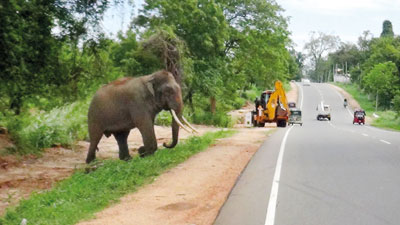News
Unknown business agenda may be behind elephant sale idea
A local politician continues to draw ridicule and raise suspicions in Sri Lanka and beyond its shores for suggesting that there are too many elephants and they should be rounded up from the wilds and be sold overseas.

An elephant spotted trying to cross the main Dambulla-Habarana Road on Friday: More than 270 elephants have been killed last year.Pic by Kanchana Kumara Ariyadasa
An elephant calf in Sri Lanka sells for upwards of US$150,000 (Rs 19 million).
In Sri Lanka, there are more elephant deaths than that of humans. More than 270 elephants have been killed last year, compared with 88 human deaths, official data show.
But the secretariat of the Convention on International Trade in Endangered Species of Wild Fauna and Flora, warned that the African elephant population in Zimbabwe would be threatened with extinction if the trade was not strictly regulated.
CITES does not have the authority to intervene in any commercial deals. But parties to the convention must report the deals to CITES.
In responding to concerns of villagers raised by a Buddhist monk at a Balangoda council meeting about elephant attacks and the death of an innocent man, Karunaratna Paranawithana, the deputy minister of Skills Development and Vocational Training, attacked Sri Lanka’s wildlife policies as “very stupid’’.
Based on the forest cover, the Jathika Hela Urumaya member, claimed there are too many elephants. Sri Lanka needs only 4,000 elephants, he said, noting that there are 6,000. “We must control the population growth of elephants.’’
He proposed: “Let’s round up the elephants and sell then to another country.’’
He said he had mentioned this to Wildlife Minister Gamini Jayawickrema Perera.
Wildlife Minister, Perera, and environmentalists this week expressed concerns over Paranawithana’s comments.
Minister Perera told the Sunday Times that the remarks could have a serious impact on Sri Lanka’s plans to host the 18th session of CITES in 2019, when more than 5,000 delegates are expected.
“The deputy Minister responsible should learn about Buddhism, wildlife and CITES before making absurd comments before the media,” he said.
Minister Perera said the suggestions were impractical.
He explained that elephants are protected animals that cannot be sold to other countries, because it violates the CITES convention.
“These kind of statements ridicule the country and will present a bad image, due to that the international good name can be lost resulting in a decision to boycott the sessions held at Sri Lanka.’’
Karunaratna made the comments, while chairing the Balangoda coordinating committee meeting held at the divisional secretariat.
Environmentalist Sashikalana Ratwatte, said environmentalists condemn the idea.
He claimed that there is only a 16.4 percent of forest cover remaining in the country therefore it’s unlikely to have a population of 6,000 elephants.
“Even though we speculate there is a high number, more than 100 elephants die per year for various reasons. If 2,000 elephants are exported it would be a violation of conservation rules,” he said.
He said nature takes care of eliminating the weak and the infirm from the wilds.
Mr Ratwatte pointed out that Sri Lanka has an an obligation to abide by the CITES convention.
He said that if ministers make comical statements and portray conservation as a joke, then, hosting the CITES session will also be seen as ridiculous.
However, the director general of D W C, M G C Sooriyabandara, said that currently the wildlife department maintains electric fencing as an effective method of keeping the elephants within the parks, but there are occasions when elephants destroy the fencing.
Fences also become useless when humans steal the solar panels, electric cables and rechargeable batteries.
Responding to charges of not having an animal management plan, he claimed that, the department controls habitat conditions, provides water during droughts and improves the ecology of national parks to sustain animals, while allowing nature to maintain a balance in the number of animals.
Meanwhile, the Jathika Hela Urumaya members defended Mr Paranawithana’s statements explaining that the people need relief from nuisance animals such as monkeys, wild boars, peacocks, and elephants.
Minister of Megapolis and Western Development Patali Champika Ranawaka said that environmentalists are only concerned about animals, but humans and animals should co-exist. To ensure co-existence, both human and animal numbers must be controlled without wiping out either.
He said that according to an elephant census while he was minister of environment and natural resources, there are 9,000 elephants in the country.
He claimed that there are about 650 births and 250 deaths. The excess should be controlled by managing wildlife.
“The majority of wild elephants are outside the parks and so are the wild boar, peacocks and monkeys who damage villages. The fellow minister has considered the impact on the people and explained that animals should be managed,” he said.
Mr Ranawaka claimed that lack of water and growth of invasive plants caused animals to stray outside parks. The DWC and environmentalist should focus on these factors, he said.

